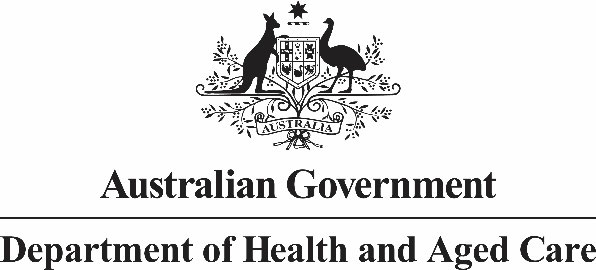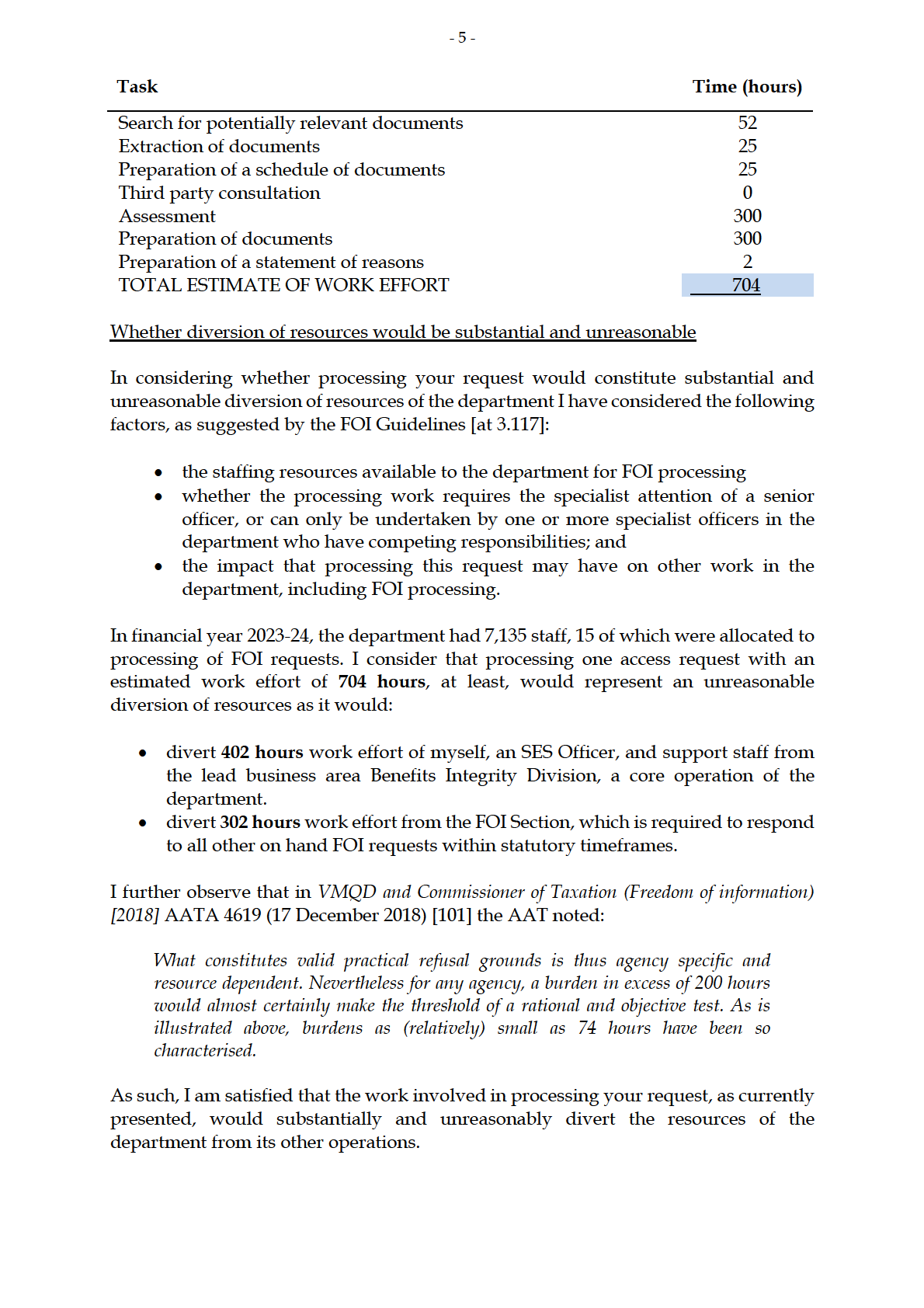
Department reference: FOI 25-0169 LD
Noseyrosey
By email: xxxxxxxxxxxxxxxxxxxxxxxxxx@xxxxxxxxxxx.xxx.xx
Dear Noseyrosey
Freedom of Information Request FOI-25-0169 LD
Notice issued under section 24AB(2) and invitation to engage in a request
consultation process
I refer to your request of 14 December 2024 to the Department of Health and Aged
Care (the department), seeking access to the following documents under the
Freedom
of Information Act 1982 (Cth) (the FOI Act). The scope of your request is as follows:
I seek access to any and all documents, records, data, and supporting material held by
[Name of Agency] concerning the sharing of personal information originating from the
Department of Veterans’ Affairs (DVA) over the last ten years. This includes any data
transfers from or to the DVA, whether they were one-off exchanges or ongoing,
systematic transfers of DVA client information, including personal, medical, financial,
or service-related details concerning veterans or their dependents.
I am interested in obtaining a comprehensive understanding of what DVA client
information [Authority name] has received or accessed and for what purposes.
Specifically, I request:
All records of data sharing arrangements between DVA and [Authority name],
including but not limited to memoranda of understanding, service-level agreements,
emails, letters, meeting minutes, file transfer logs, internal reports, and instructions
that outline what data was shared, when it was shared, and the format or system used
for the transfer.
Any policies, procedures, guidelines, or frameworks that govern how [Authority name]
requests, obtains, stores, handles, or uses DVA client information. This includes
documents that detail the criteria for approving access to such data, any consent or
authorization processes, security controls, and retention or destruction policies.
Copies of any ethics committee approvals, privacy impact assessments, internal review
board decisions, or other documents that reflect deliberations or authorizations for
obtaining DVA client information. This includes records that show the agency
considered the ethical, legal, or privacy implications of receiving or using DVA client
data.
GPO Box 9848 Canberra ACT 2601
- www.health.gov.au
- 2 -
Documents that outline the intended uses or practical applications of the DVA client
data, such as project proposals, business cases, internal strategy papers, or briefings that
explain why [Authority name] sought access to this information, how it was intended
to be integrated into the agency’s operations, and any expected outcomes or benefits.
A representative sample (in a suitably de-identified or redacted form) of the data or data
fields received, so long as providing this sample does not breach any exemption under
the FOI Act. The purpose is to understand the nature and granularity of the information
shared, without disclosing identifiable personal details.
If the only data [Authority name] received pertains solely to data linked to the
Centrelink Confirmation eServices (CCeS) arrangements as described at
https://www.servicesaustralia.gov.au/centrelink-confirmation-eservices-cces, and there
were no other forms of DVA data shared, then no CCeS-related data needs to be provided
under this request.
Power to refuse request
I am an officer authorised under subsection 23(1) of the FOI Act to make decisions in
relation to FOI requests.
I am writing to notify you that I believe the work involved in processing your request
in its current form would substantially and unreasonably divert the resources of the
department from its other operations. This constitutes a ‘practical refusal reason’
under section 24AA of the FOI Act.
I am currently considering refusing your access request on the basis of the practical
refusal reason. However, before I make a final decision on your request, you have an
opportunity to revise your request to remove the practical refusal reason. This is called
a ‘request consultation process’ as per section 24AB of the FOI Act.
Practical refusal reason
Section 24AA(1) of the FOI Act provides that a
practical refusal reason exists in relation
to a request for a document or either (or both) of the following applies:
(a) the work involved in processing the request would substantially and
unreasonably divert the resources of the agency from its other operations; or
(b) the request does not satisfy the requirement in paragraph 15(2)(b).
My assessment of the section 24AA(1)(a) practical refusal reason is as follows:
Search and retrieval of documents
The department has undertaken preliminary searches for documents in scope of your
request, as per the Office of the Australian Information Commissioner’s Freedom of
Information Guidelines [at 3.89].
- 3 -
These searches were undertaken by officers of divisions within the department with
knowledge of and responsibility for the subject-matter of your request, having regard
to the department’s record management systems and the age of the documents sought.
This preliminary search has so far taken by one business area approximately
52 hours
to identify approximately 1,500 documents that are potentially relevant to your
request. Other business areas within the department are likely to hold documents that
could potentially be in scope of your request.
Sampling
As per the FOI Guidelines [at 3.121], the business area responsible for your request has
examined a sample of the documents potentially in scope of your request to determine
the potential processing requirements of your request.
The department sampled 100 documents (that is, approximately 15 per cent of the 1500
documents identified as potentially in scope of the request), with an average of 4 pages
each.
On the basis that the preliminary searches identified approximately 1500 documents
potentially relevant to your request, and the sampled documents had an average of
4 pages, I estimate that the documents potentially in scope of your FOI request can
reasonably be estimated to comprise some
6,000 pages for assessment.
Extraction and scheduling of documents
To process your request further, the department would need to extract approximately
1,500 documents from its record management and/or computer systems and manually
review each document to ensure that it falls within scope of your request.
On the basis that extraction and conversion of documents to an editable format would
take approximately 1 minute per document, I estimate that the extraction process
would take at least
25 hours to complete. Duplicate documents would also be
identified and removed during this process.
The department would then need to create a schedule of documents in scope of the
request. On the basis that it would take approximately 1 minute per document to enter
the required information into a table, I estimate that the scheduling process would take
at least
25 hours to complete.
Assessment
As an officer authorised to make a decision regarding your request, I would then be
required to read and assess each page of each document in scope of your request
against the FOI Act to decide whether to grant, refuse or defer access to the information
in any document in scope of your request.
If all documents so far identified as potentially relevant to your request are determined
to be in scope of your request, I would need to review approximately
6,000 pages of
material.
- 4 -
On the basis that assessment would take me an average of 3 minutes per page,
I estimate that it would take at least
300 hours to make a decision on access to the
documents potentially in scope of your request.
Third party consultation
The department may need to consult with affected third parties in accordance with the
statutory provisions of sections 27 and 27A the FOI Act.
At this stage, without undertaking a closer review of the content of the documents
potentially in scope of your request, I am unable to estimate whether third-party
consultation is required or how long consultation might take. I have not, therefore
included any estimate for this work effort in my practical refusal calculations.
Document preparation
Once I had assessed each of the documents in scope of your request, officers of the
department would then need to prepare the documents in scope of your request by
applying any relevant deletions or exemptions. Assuming this process would take an
average of 3 minutes per page, I estimate that it would take the department at least
300 hours to prepare the documents for decision.
The department would also need to prepare a statement of reasons, as required by
section 15 the FOI Act. I anticipate it would take an officer of the department
approximately
2 hours to prepare this statement of reasons for my final review and
decision.
Summary
As outlined above, and noting that these estimates are based on very conservative
assumptions, I estimate that it would take the department at least
704 hours to process
your request, as summarised below:

- 6 -
Request consultation process
You now have an opportunity to revise your request to enable it to proceed.
You could revise your request by narrowing the scope of the request and/or providing
greater detail about the documents you wish to access. Providing more specific
information about the format, timeframes, and substance of the documents you are
interested in will enable the department to conduct targeted searches for documents
of interest.
For example, the scope of the request could be revised to:
• Narrow the timeframe e.g. limit the time period of documents between X and
Y date (requesting specific dates rather than just “the last 10 years” makes it
easier to search)
• Exclude documents publicly available on the department’s website, for
example, the information that has been released and accessible on the
department’s disclosure log relating to data matching legislation.
• Specify the types of documents required, for example, seeking copies MOUs,
agreements, records of data being shared by DVA and what it was used for.
• Copies of finalised/signed documents, and exclude draft documents or where
no decisions were made, or actions progressed, for example, meetings
discussing how data matching may be done in general, proposals that did not
go any further.
The request consultation period runs for 14 days and starts on the day after you receive
this notice.
Before the end of the consultation period, you must do one of the following, in writing:
• withdraw your request
• make a revised request, or
• tell us that you do not wish to revise your request.
If you do not do one of the three things listed above during the consultation period,
or you do not consult the contact person during this period, your request will be taken
to have been withdrawn.
If you agree to revise your request in a way that removes the practical refusal reason
outlined above, the department will recommence processing your request. Please
note: as per section 24AB(8) of the FOI Act the time taken to consult you regarding the
scope of your request is not counted in the statutory timeframe provided for
processing your request.
Please contact FOI section on the contact details below if you have any questions or
require assistance responding to the practical refusal notice.

- 7 -
Legislative provisions
The FOI Act, including the provisions referred to above, are available on the Federal
Register of Legislation website: www.legislation.gov.au/Series/C2004A02562
Contact officer
For the purposes of this consultation, the contact officer for your request is:
Tritiya
Phone: (02) 6289 1666
Email: xxx@xxxxxx.xxx.xx.
Yours sincerely
Brigid Dohnt
Assistant Secretary
Medicare Integrity Reform Branch
3 January 2025


